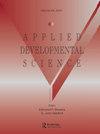Latinx adolescents’ school-related science conversations with family members: Associations with adolescents’ science expectancy-value beliefs in high school
IF 1.7
3区 心理学
Q3 PSYCHOLOGY, DEVELOPMENTAL
引用次数: 1
Abstract
Abstract Integrating situated expectancy-value and family systems theories, the current study tested the extent to which Latinx adolescents’ 9th-grade school-related science conversations with parents and older siblings/cousins positively predicted their 10th-grade science ability self-concepts and task values. We also tested whether these links were moderated by who primarily initiated the conversations (i.e., adolescents, family members, or both). We used two-wave, multi-reporter survey data from 104 Latinx families, consisting of triads of parents, older siblings/cousins, and adolescents (89% Mexican-descent, 40% female; M age = 14.53 years). Partially supporting our hypotheses, parent-adolescent school-related science conversations predicted adolescents’ 10th-grade science ability self-concepts. Moreover, the links between parent-adolescent conversations and science ability self-concepts and task values were positive and significant when parents more frequently initiated conversations than adolescents. Similar but weaker associations were found for sibling/cousin-adolescent school-related science conversations. These findings underscore the motivational benefits of family members initiating school-related science conversations with Latinx adolescents.拉丁裔青少年与家庭成员的学校相关科学对话:与高中青少年科学期望价值信念的关联
摘要本研究整合情境期望价值理论和家庭系统理论,检验了拉丁裔青少年9年级与父母和兄弟姐妹/表姐妹的学校相关科学对话对其10年级科学能力自我概念和任务价值观的正向预测程度。我们还测试了这些联系是否受到主要发起对话的人(即青少年、家庭成员或两者)的调节。我们使用了来自104个拉丁裔家庭的两波、多报告者调查数据,包括父母三合一、年长的兄弟姐妹/表兄弟姐妹和青少年(89%是墨西哥裔,40%是女性;M年龄= 14.53岁)。家长-青少年学校相关科学对话预测青少年10年级科学能力自我概念,部分支持我们的假设。此外,当父母比青少年更频繁地发起对话时,父母-青少年对话与科学能力自我概念和任务价值观之间存在显著的正相关。类似但较弱的关联也存在于兄弟姐妹/表兄弟姐妹与青少年学校相关的科学对话中。这些发现强调了家庭成员与拉丁裔青少年发起与学校有关的科学对话的激励效益。
本文章由计算机程序翻译,如有差异,请以英文原文为准。
求助全文
约1分钟内获得全文
求助全文
来源期刊

Applied Developmental Science
PSYCHOLOGY, DEVELOPMENTAL-
CiteScore
12.00
自引率
2.60%
发文量
23
期刊介绍:
The focus of this multidisciplinary journal is the synthesis of research and application to promote positive development across the life span and across the globe. The journal publishes research that generates descriptive and explanatory knowledge about dynamic and reciprocal person-environment interactions essential to informed public dialogue, social policy, and preventive and development optimizing interventions. This includes research relevant to the development of individuals and social systems across the life span -- including the wide range of familial, biological, societal, cultural, physical, ecological, political and historical settings of human development.
 求助内容:
求助内容: 应助结果提醒方式:
应助结果提醒方式:


